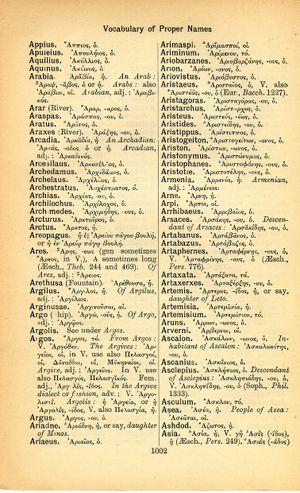Ariminum
πολλάκις δοκεῖ τὸ φυλάξαι τἀγαθὰ τοῦ κτήσασθαι χαλεπώτερον εἶναι → it often proves harder to keep than to win prosperity | it is often harder for men to keep the good they have, than it was to obtain it
English > Greek (Woodhouse)
Ἀρίμενον, τό.
Latin > English (Lewis & Short)
Ărīmĭnum: i, n.,
I a town in Umbria, on the shore of the Adriatic, at the mouth of a river of the same name; the most northern place of Italy proper, connected with Rome by the Via Flaminia, now Rimini, Plin. 3, 15, 20, § 115; Luc. 1, 231; cf. Mann. Ital. I. 455.—Hence, Ărīmĭnensis, e, adj., pertaining to Ariminum: folia, Hor. Epod. 5, 42: ager, Plin. 10, 21, 25, § 50; subst.: Ărīmĭnenses, ium, m., the inhabitants of Ariminum, Cic. Verr. 2, 1, 14; id. Caecin. 35, 112.
Latin > French (Gaffiot 2016)
Ărīmĭnum,¹² ī, n., Ariminum [ville de l’Ombrie] : Cic. Fam. 16, 5, 2 ; Liv. 21, 51, 7, etc. || -ēnsis, e, d’Ariminum : Plin. 10, 50 et -ēnsēs, habitants d’Ariminum : Cic. Cæc. 102.
Latin > German (Georges)
Arīminum, ī, n., Stadt u. gleichn. Fluß in Umbrien, von den Römern kolonisiert, j. Rimini, Fl. Marcochia, Caes. b. c. 1, 8, 1. Vell. 1, 14, 7. Sulp. Sev. 2, 41, 1 u. 45, 8. – Dav. Arīminēnsis, e, zu Ariminum gehörig, ariminensisch, Folia, Hor.: ager, Plin.: synodus, Sulp. Sev.: Plur. subst., Arīminēnsēs, ium, m., die Einw. von Ar., die Ariminenser, Cic.

